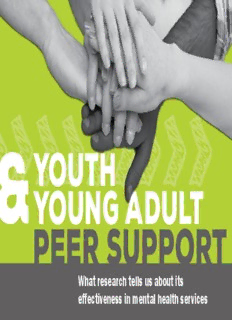
peer support PDF
Preview peer support
YOUTH & YOUNG ADULT PEER SUPPORT What research tells us about its effectiveness in mental health services Youth & Young Adult Peer Support What research tells us about its effectiveness in mental health services Suggested Citation Jackson, S., Walker, J. S., & Seibel, C. (2015). Youth & Young Adult Peer Support: What Research Tells Us About its Effectiveness in Mental Health Services. Portland, OR: Research and Training Center for Pathways to Positive Futures, Portland State University. 2 Introduction Increasing the availability of peer support for youth and young adults with serious mental health conditions has been advocated by service users, researchers, and government commissions. Efforts to provide peer support for young people are becoming more and more common. This FAQ describes the research evidence for peer support, as well as some of the challenges that can be expected when peer support is implemented. 3 What is peer Peer support can be defined as “offering and receiving help, based on shared support in the understanding, respect, and mutual context of empowerment between people in similar mental health situations.”1 It is assumed that people who have experienced and overcome a particular programs? type of adversity can serve as source of support, encouragement and hope to others experiencing similar situations, ››› and may also be uniquely positioned to promote service engagement.2–4 Peer support is a quickly growing segment of the 4 mental health workforce,2,3 and increasing the availability of peer support has been advocated by service users, researchers, and government commissions.4–8 Peer support may be particularly useful in the context of providing services to young adults with significant mental health challenges because existing services and systems do not adequately attract, engage, or serve young people.9–11 5 What is the Peer support providers that work with youth or young adults can take on role of a youth/ a variety of tasks. Exactly what they do young adult peer depends on the type of program they are support provider? working in, the funding source for their work, the skills they possess, and the individual needs of the young people they are working with.12 Peer support can be delivered individually, to young people ››› in pairs or in groups, and peer support can happen in person or over the phone or the internet.13 Some of the common 6 duties that are part of the peer support role include providing one-on-one coaching and advocacy, facilitating groups, promoting young people’s active participation in treatment and in meetings with professionals, helping young people navigate services or undertake activities in the community, coordinating community events for young people, publically sharing personal stories of hope and recovery, engaging in discussions around public policy and legislative activities, and encouraging young people to participate in systems activism.12 7 What does There is almost no research that directly addresses the impact research have of peer support for youth or young to say about the adults with serious mental health impact of peer conditions (SMHC’s).14 A single study has examined this issue and found support in mental that young people who had access to health services for peer support were more satisfied with their services than young people who youth and young ››› did not have access to peer support.15 adults? The young people who had access to peer support were also more satisfied 8 with their participation in services and the appropriateness of the services received, and they reported better outcomes in some areas of functioning. While these findings are promising, much more research will be needed before there is conclusive evidence that peer support for youth and young adults has a positive impact. 9 Is there evidence Peer support within adult mental health services has been studied more showing the frequently than peer support for youth and benefits of peer young adults, but the number of studies support in other in this area is still small. A research review published in 2014 concluded that the most types of mental rigorous studies provided “little evidence” for health services? the effectiveness of peer support for adults.3 However, less rigorous studies have found ››› that peer support services for adults can have positive impacts in a variety of areas including hope and belief in the possibility 10
Description: